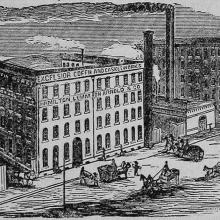Shirley Yee’s article “Undertaking Pittsburgh: The Makings of the Casket Industry in the Steel City, 1865-1910,” recently published in Pennsylvania History: A Journal of Mid-Atlantic Studies, examines the central role the Steel City played in modernizing the funeral industry. The period was a formative one in the move toward the corporatization of industry, and Yee's article departs from more well-known stories of iron, glass, and coal to focus on the move toward mass production of caskets.
Piecing together information from funeral trade histories, death certificates, newspaper articles and advertisements, city directories, census reports, and histories of local businesses, Yee traces labor relations as well as discrimination and exploitation across race, ethnic, gender, and class lines. Immigrant tradesmen in carpentry and furniture moved into casket-making, while women working in textile mills produced fabrics essential for casket linings. However, discrimination meant that others, such as the Chinese, were excluded and forced to rely upon ethnic outsiders for funeral services. Discrimination also led to community-building efforts such as the establishment of the National Negro Funeral Directors Association.
As an extension of Yee’s previous research in An Immigrant Neighborhood: Interethnic and Interracial Encounters in New York before 1930, “Undertaking Pittsburg” begins with the material object of the casket as an important public expression of mourning to map a complex picture of social and economic life.
